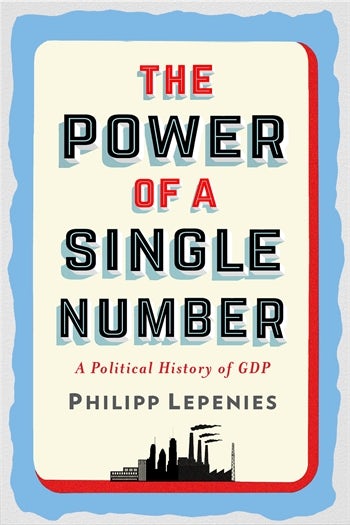The Power of a Single Number
A Political History of GDP
Columbia University Press

The Power of a Single Number
A Political History of GDP
Columbia University Press
Widely used since the mid-twentieth century, GDP (gross domestic product) has become the world's most powerful statistical indicator of national development and progress. Practically all governments adhere to the idea that GDP growth is a primary economic target, and while criticism of this measure has grown, neither its champions nor its detractors deny its central importance in our political culture.
In The Power of a Single Number, Philipp Lepenies recounts the lively history of GDP's political acceptance—and eventual dominance. Locating the origins of GDP measurements in Renaissance England, Lepenies explores the social and political factors that originally hindered its use. It was not until the early 1900s that an ingenuous lone-wolf economist revived and honed GDP's statistical approach. These ideas were then extended by John Maynard Keynes, and a more focused study of national income was born. American economists furthered this work by emphasizing GDP's ties to social well-being, setting the stage for its ascent. GDP finally achieved its singular status during World War II, assuming the importance it retains today. Lepenies's absorbing account helps us understand the personalities and popular events that propelled GDP to supremacy and clarifies current debates over the wisdom of the number's rule.
In The Power of a Single Number, Philipp Lepenies recounts the lively history of GDP's political acceptance—and eventual dominance. Locating the origins of GDP measurements in Renaissance England, Lepenies explores the social and political factors that originally hindered its use. It was not until the early 1900s that an ingenuous lone-wolf economist revived and honed GDP's statistical approach. These ideas were then extended by John Maynard Keynes, and a more focused study of national income was born. American economists furthered this work by emphasizing GDP's ties to social well-being, setting the stage for its ascent. GDP finally achieved its singular status during World War II, assuming the importance it retains today. Lepenies's absorbing account helps us understand the personalities and popular events that propelled GDP to supremacy and clarifies current debates over the wisdom of the number's rule.
It is an amazing but little-remarked fact that governments all over the world take as their top economic objective the increase of one number: gross domestic product. Philipp Lepenies traces how this strange unanimity came to be, taking the reader on a colorful journey through England, Germany, and the United States and bringing things into the present with an account of current debates about replacing or supplementing GDP with other indicators of welfare. The Power of a Single Number is beautifully written and easily accessible to anyone who wants to know more about what lies behind the world's most powerful number. Robert H. Wade, London School of Economics. Leontief Prize winner, 2008.
A great book on understanding why GDP was put at the center of the political and economic framework that has driven the world over the past sixty years and why this choice led to the underestimating of other issues, such as socioeconomic inequalities and environmental degradation. The Power of a Single Number also provides insights on how to build a 'post GDP' era, especially in the context of a possible future 'secular stagnation.' Enrico Giovannini, University of Rome
By asking how GDP became the most influential economic statistic of our time, Lepenies provides a fascinating new perspective on the history of empirical economics. Economists play important roles in his account, but ultimately it was politics and the priorities of wartime that drove the demand for GDP measurement. While many economists today are well aware of its limitations, political inertia keeps GDP on its throne. Martin Ravallion, Georgetown University
This little book about a big number will impress readers who might never have previously considered the statistics underlying our lives. Publishers Weekly
Lepenies's absorbing account helps us understand the personalities and popular events that propelled GDP to dominance, clarifying current debates over the wisdom of the number's rule. 800-CEO-READ
[An] informative book. Richard N. Cooper, Foreign Affairs
Recommended. CHOICE
Introduction
1. What It's All About: A Short Primer on GDP
2. William Petty and Political Arithmetic: The Origins of GDP
3. The Frustrations of Colin Clark: England
4. Simon Kuznets and the Politics of Gross National Product: The United States
5. War, Kidnapping, and Data Theft: Germany
6. The Ultimate Triumph of Gross National Product
Conclusion
Notes
Index
1. What It's All About: A Short Primer on GDP
2. William Petty and Political Arithmetic: The Origins of GDP
3. The Frustrations of Colin Clark: England
4. Simon Kuznets and the Politics of Gross National Product: The United States
5. War, Kidnapping, and Data Theft: Germany
6. The Ultimate Triumph of Gross National Product
Conclusion
Notes
Index
Read an excerpt from the first chapter:
